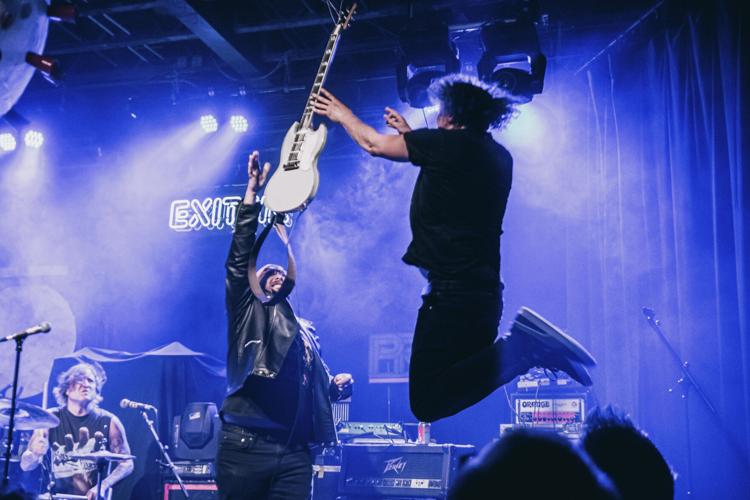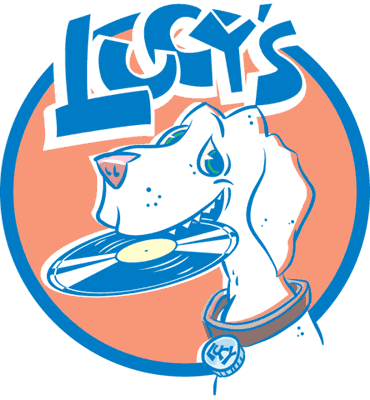
In the summer of 1997, I moved to Nashville, ready to enter college and fully engrossed in fringe musics. One of my first priorities was to find a place to meet like-minded peers. I found myself wandering around Dancin’ in the District, the weekly outdoor concert series that seemed to be the only thing drawing people to the ghost town of Lower Broadway. I spied a kid about my age, toting a skateboard and wearing a pin with the logo of British Oi! luminaries The Business. I told him I had just moved to town and wondered where punk shows happened.
“The punks all hang out at Lucy’s,” he said. That was the sum total of the interaction, but few events in my life stand out as paradigm shifts on par with finding out about Lucy’s Record Shop. Before the web emerged as a way to create connections within and around underground scenes, chance encounters like this were crucial to youth cultures on the periphery of mainstream society — in which young people, fed up with getting told they don’t belong and don’t count, can find community and practice expressing themselves.
That’s the legacy of Lucy’s. The record shop and accidental cultural center, named for owner Mary Mancini’s gentle Weimaraner, operated at 1707 Church St. from 1992 to 1998. As well as being a haven for locals, Lucy’s hosted Bikini Kill, Jawbreaker, They Might Be Giants, Yo La Tengo, Nashville’s own Lambchop, and legions of other bands touring the Southeast in used Econolines. In the run-up to the 30th anniversary of the store’s opening, Mancini launched the Lucy’s Record Shop podcast, in which she speaks with a broad spectrum of people, from musicians to doctors to community organizers and beyond, for whom the shop’s relatively brief existence was critical.
While being mostly free from rules, Lucy’s had one strict, defining policy: “No racist, sexist, or homophobic shit tolerated!” It seems like common sense in 2022, but it was unusual at the time, something not lost on the folks running the show.
“We took a chance when we intertwined the business with the motto,” Mancini tells me. She opened Lucy’s not long after moving to Nashville from New York. “But it was the right thing to do. My partners Don and April Kendall were from here and probably knew more than me there could be consequences. But they didn’t blink an eye.” As the podcast’s first episode explains, the Kendalls and their DIY show-booking enterprise House O’ Pain were instrumental in connecting Lucy’s with the audience who would come to call it home.
The anniversary celebration continues on Sunday with an all-day extravaganza at all-ages space Drkmttr, a spiritual heir to Lucy’s whose building Mancini co-owns with several other Lucy’s alums. The bill is loaded with reunited bands who appeared regularly on Lucy’s calendar, like 12v Negative Earth and Spider Virus. There are also newer projects from musicians who found Lucy’s at formative times in their lives, like Black Bra, Hans Condor and Electric Python. The bill is rounded out with newer arrivals to Nashville who are sympathetic to the cause, like Total Wife, and local young folks like Amira the Weirdo and Dru the Drifter.

Hans Condor at Exit/In, 4/9/2022
“I can’t really think of a place or time period that was more influential to my life than the years Lucy’s Record Shop was open,” says Dallas Thomas. “By going to shows there, it made me realize it was possible to get in a van and play music all over the world.” The 44-year-old has a long career with much-loved bands on the heavy end of the spectrum, like Asschapel and Pelican, which have taken him all over the country. He played his first show with a band called Blend, later renamed Fingerhutt, at Lucy’s in 1992. His latest project, a Chicago hardcore outfit called Ready for Death, will play on Sunday.
Another Lucy’s habitué who has continued to make great music is Mike Shepherd. You’ll know him from Nashville post-punk bands like Apollo Up! and Tower Defense. He’ll be at Drkmttr on Sunday too, playing in the gnarly, grungy Schtucket. The band debuted at Lucy’s in 1995, on his 18th birthday. “We had the honor of playing that stage 10 times in three years, and we absolutely would not be still making music today if it hadn’t been for the space Lucy’s provided,” Shepherd says.
Nearly a quarter-century after the 200-capacity punk refuge locked its doors for the final time, Lucy’s is still revered by those who were there firsthand. A broad array of kids who learned what an arts scene can be during the time they spent there have let that spirit guide their lives in one way or another. That includes musicians like Thomas and Shepherd; medical pros like neurologist Dr. James Noble, multidisciplinary artists like Christine Hall and philosophy professors like Dr. Corey Kittrell, who are all among the podcast interviewees; and activist-artists like Fahmi Reza — an internationally known antifacist artist from Malaysia who illustrated flyers for Lucy’s while he studied at Vanderbilt. Mancini herself went on to lead the Tennessee Democratic Party for a time.
“One of the things I’m most proud of is that Lucy’s really impacted an entire generation of artists, musicians, activists and youth-culture offspring in Nashville,” Mancini says. “You run into them, or read about something they’re creating now, or see them with their kids on social media, and the connection becomes even stronger.”







